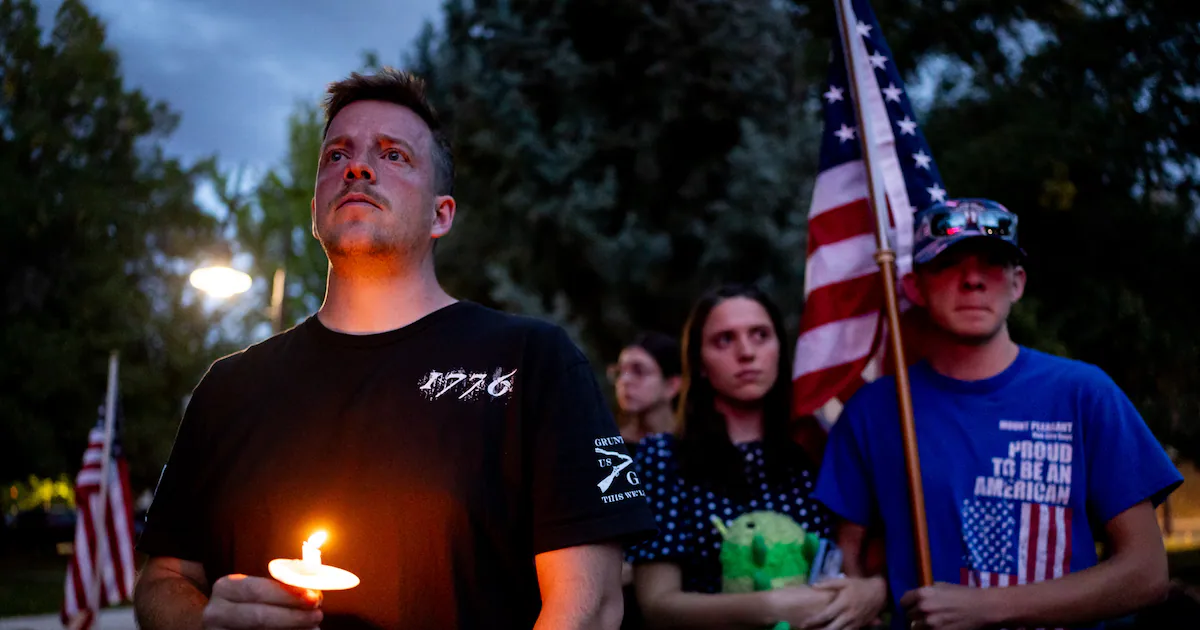
The vast majority of Americans are at least somewhat concerned about gun violence in the U.S. today. And most of them say they’re “very concerned.”
That’s according to a nationally representative Morning Consult poll taken for Deseret News and the University of Utah’s Hinckley Institute of Politics within days of the targeted killing of conservative political activist Charlie Kirk on the Utah Valley University campus Sept. 10.
In the survey of 2,239 U.S. adults, 63% said they were very concerned, while another 21% were somewhat concerned. Seven percent said they were not too concerned, while 4% said they were not at all concerned. The other 5% said they didn’t know or had no opinion. The survey has an error margin of plus or minus 2 percentage points.
Older adults were more likely to say they are very concerned with gun violence (72%), compared to those 18-34 (61%), those ages 35-44 (56%) and those ages 45-64 (63%).
Among females, 87% were at least somewhat concerned, compared to 82% of males. In both cases, the vast majority were very concerned.
The survey also asked if Kirk’s murder affected their opinion on gun control laws in the U.S. Nearly half (46%) said their opinion on gun control had not changed in either direction, while 30% said they now support stricter gun control laws. Eight percent said they now oppose stricter gun control laws, while 16% said they don’t know or no opinion.
There was no difference by gender in whether the shooting changed a respondent’s mind on gun control laws. For both men and women, 30% said they now support stricter gun control laws, while 46% said there has been no change in opinion.
Notably, nearly half of Democratic men (49%) said they now support stricter gun laws, while for just 35% there was no change of opinion. Of all the demographic ways to look at the question, that was the highest number to say they changed their mind. Among Republican men, 26% said that.
Utahns’ views on gun violence
In a separate Morning Consult poll conducted Sept. 12-14 of 502 Utah adults, women expressed more concern about gun violence than men, with 63% saying they were very concerned and 24% saying somewhat concerned, compared to half of men who were very concerned and 28% who were somewhat concerned. The survey error margin was plus or minus 4 percentage points.
Among all adult age groups, the vast majority of Utahns were concerned, though there was variation in the degree of concern. But regardless of age, at least half put themselves in the very concerned category.
Baby boomers, who were born between 1946 and 1964, expressed the most concern about gun violence, with 69% saying they were “very concerned.” More Gen Z (born between 1997 to 2012) were very concerned at 64% than were millennials (born between 1981 and 1996) at 52% and Gen X (born 1965 to 1980), with 47% of them saying very concerned.
Among self-identified Democrats in the Utah poll, 80% said they were very concerned and 17% were somewhat concerned about gun violence, compared to 56% of independents in the very concerned category and 28% in the somewhat concerned category. Fewer than half of Republicans (45%) were very concerned, while 29% were somewhat concerned.
In all income categories, more than half said they were very concerned.
Asked about whether Kirk’s shooting changed their opinion on gun control, the majority of Utahns said it had not changed their mind in either direction, including 63% of men and 58% of women. But 20% of men and 24% of women said they now support stricter gun laws. Among men, 8% said they now oppose stricter gun laws, as do 6% of women.
Gun rules in America
After 19 children and two teachers were murdered in an elementary school shooting in Uvalde, Texas, in 2022, the U.S. Senate passed what the New York Times described as “the most significant gun control bill since the long-expired federal ban on assault weapons.”
The article notes that was also the day the Supreme Court said states like New York and California couldn’t stop people from carrying guns outside their homes.
Since then, gun laws have largely been a back-and-forth battle with patchwork provisions.
Many states no longer have permit requirements to carry a gun. About half the states now have red flag laws to take guns away from those believed to be a risk for self-harm or harming others. Some states have experimented with gun-free zones. But like all the gun-related provisions, there have also been court challenges, some still in the process.
Federally there are age restrictions, background check provisions and prohibited-persons provisions, among other rules.
On a state level, some require a permit to buy or carry guns, rules vary on conceal/open carry requirements, there are different waiting periods and several states — California, New Jersey and New York — have rules about assault-style rifles.



